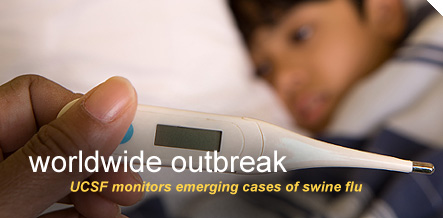UPDATED: UCSF Officials Monitor Worldwide Outbreak of Swine Flu

UCSF Medical Center and campus officials continue to monitor national, state and local health reports following a worldwide outbreak of swine flu, including 30 confirmed human cases in California.
Swine flu is an epidemic respiratory disease of pigs caused by type A influenza virus, typically the H1N1 or H3N2 strain. Swine flu viruses do not normally infect humans, but sporadic human infections do occur. Since 2005, 12 human cases of swine flu have been detected in the United States and all patients recovered.
Take these daily actions to stay healthy.
- Cover your nose and mouth with a tissue when you cough or sneeze. Throw the tissue in the trash after you use it.
- Wash your hands often with soap and water, especially after you cough or sneeze. Alcohol-based hand cleaners are also effective.
- Avoid touching your eyes, nose or mouth. Germs spread that way.
- If you get sick, the CDC recommends that you stay home from work or school and limit contact with others to keep from infecting them.
As of 9:30 a.m. (PST) on May 4, a total of 286 cases of swine flu infection have been confirmed in the United States, according to the Centers for Disease Control and Prevention (CDC). The nation’s first and only fatality from this outbreak involved a child from Mexico who died in Texas.
The World Health Organization (WHO) on May 4 is reporting that 20 countries have officially reported 985 case of the HINI flu infection. The WHO has maintained the worldwide pandemic alert level at Phase 5, which indicates a “strong signal that a pandemic is imminent.”
UCSF has activated its Hospital Command Center and the campus Emergency Operations Center in response to the WHO’s pandemic alert level. Campus and medical center officials are conferring daily to address UCSF’s preparation and response to the outbreak. UCSF Today will continue to issue updates on the swine flu outbreak as necessary.
The CDC is posting regular updates on its website.
Currently, no cases of swine flu have been reported at UCSF, according to Amy D. Nichols, RN, director of Hospital Epidemiology and Infection Control at UCSF Medical Center.
If a patient with flu-like symptoms presents to UCSF, clinicians are asked to follow the directions for specimen collection and submission to the San Francisco Department of Public Health lab and to notify UCSF Infection Control by calling the pager number 415/443-2644. Health alerts, advisories and updates are available on the San Francisco Communicable Disease Health alert webpage.
Last week, Gov. Arnold Schwarzenegger declared a state of emergency in California, where probable cases of swine flu have been reported in three Bay Area counties.
Top officials of the Obama administration on Sunday held a White House briefing saying that they are responding aggressively to the outbreak on multiple fronts. Richard Besser, MD, acting director of the CDC, said that the CDC is working very closely with officials in states where human cases of swine influenza have been identified, as well as with health officials in Mexico, Canada and the World Health Organization (WHO).
The good news, Besser added, is that we’re nearing end of the flu season, in which viruses tend to be easily transmitted. But he said that every outbreak is different.
On Sunday, Secretary of the Department of Homeland Security Janet Napolitano declared a public health emergency in the United States, which is a standard operating procedure that allows funds and medications to be released in support of the public health response.
Napolitano said that the United States has 50 million antiviral drug courses in the strategic national stockpile, and that the federal government is releasing 25 percent of those courses and making them available to states where there are confirmed cases of swine flu.
The US Department of Agriculture is involved in testing livestock to ensure that there is no concern about the food supply, Napolitano said on Sunday. She pointed out that people cannot get swine flu from eating pork.
The most important precaution that people can take to avoid getting the flu is practicing proper hygiene practices, including regular hand washing and covering the mouth when coughing. People who have flu-like symptoms should not go to work or school.
For UCSF Human Resource FAQ on communicable disease emergencies, go to the UCSF HR website.
Related Links:
UCSF Infectious Disease Expert Answers Questions About Swine Flu
UCSF Science Cafe, April 27, 2009
San Francisco Communicable Disease Control and Prevention
Swine Influenza (Flu)
Centers for Disease Control and Prevention